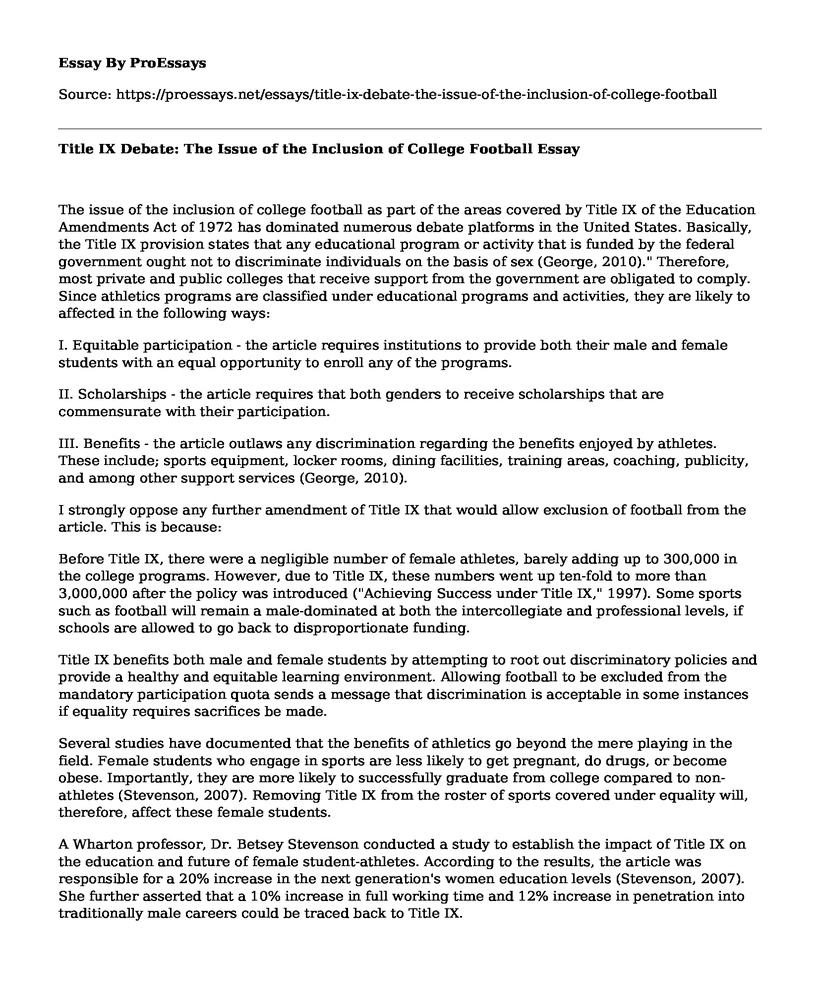The issue of the inclusion of college football as part of the areas covered by Title IX of the Education Amendments Act of 1972 has dominated numerous debate platforms in the United States. Basically, the Title IX provision states that any educational program or activity that is funded by the federal government ought not to discriminate individuals on the basis of sex (George, 2010)." Therefore, most private and public colleges that receive support from the government are obligated to comply. Since athletics programs are classified under educational programs and activities, they are likely to affected in the following ways:
I. Equitable participation - the article requires institutions to provide both their male and female students with an equal opportunity to enroll any of the programs.
II. Scholarships - the article requires that both genders to receive scholarships that are commensurate with their participation.
III. Benefits - the article outlaws any discrimination regarding the benefits enjoyed by athletes. These include; sports equipment, locker rooms, dining facilities, training areas, coaching, publicity, and among other support services (George, 2010).
I strongly oppose any further amendment of Title IX that would allow exclusion of football from the article. This is because:
Before Title IX, there were a negligible number of female athletes, barely adding up to 300,000 in the college programs. However, due to Title IX, these numbers went up ten-fold to more than 3,000,000 after the policy was introduced ("Achieving Success under Title IX," 1997). Some sports such as football will remain a male-dominated at both the intercollegiate and professional levels, if schools are allowed to go back to disproportionate funding.
Title IX benefits both male and female students by attempting to root out discriminatory policies and provide a healthy and equitable learning environment. Allowing football to be excluded from the mandatory participation quota sends a message that discrimination is acceptable in some instances if equality requires sacrifices be made.
Several studies have documented that the benefits of athletics go beyond the mere playing in the field. Female students who engage in sports are less likely to get pregnant, do drugs, or become obese. Importantly, they are more likely to successfully graduate from college compared to non-athletes (Stevenson, 2007). Removing Title IX from the roster of sports covered under equality will, therefore, affect these female students.
A Wharton professor, Dr. Betsey Stevenson conducted a study to establish the impact of Title IX on the education and future of female student-athletes. According to the results, the article was responsible for a 20% increase in the next generation's women education levels (Stevenson, 2007). She further asserted that a 10% increase in full working time and 12% increase in penetration into traditionally male careers could be traced back to Title IX.Conclusion
In conclusion, it is clear that the Title IX has facilitated the giant strides made in the education sector towards eradicating gender-based discrimination. The benefits that accrue to the female student-athletes both in college and after school cannot possibly be ignored in the face of research from scholars like Dr. Stevenson. The availability of equal opportunities to play any sport, including the previously gender-segregated sports such as football, provides a sense of hope to young girls in high school, who are aspiring to be professional football players. Exclusion of the football programs from Title IX will, therefore, be rolling back the gains made through inclusion, over the past few decades.
Questions
- Why do you think that discriminating against female football programs is the answer to the problem, rather than the increasing fund allocations or increasing scholarship positions?
- Why should the female football program be the one to bear the brunt of insufficient funds?
- Can you explain why you think the documented success reaped from the Title IX is not useful enough to continue with inclusion?
References
Achieving Success under Title IX (continued). (1997, July 10). Www2.ed.gov. Retrieved, from https://www2.ed.gov/pubs/TitleIX/part5.html
George, B. G. (2010). Forfeit: Opportunity, choice, and discrimination theory under Title IX. Yale Journal of Law & Feminism, 22(1), Article 2.
Stevenson, Betsey (2007). Title IX and the evolution of high school sports. Contemporary Economic Policy 25(4), 486-505.
Cite this page
Title IX Debate: The Issue of the Inclusion of College Football. (2022, Mar 29). Retrieved from https://proessays.net/essays/title-ix-debate-the-issue-of-the-inclusion-of-college-football
If you are the original author of this essay and no longer wish to have it published on the ProEssays website, please click below to request its removal:
- Rental Properties and Government Fight Against Same-Sex Marriage in Canada and Bermuda
- National Approach to the Mission of Homeland Security Paper Example
- Experiential Learning Theory Paper Example
- Essay on Jesus on Anger: Hatred Equals Murder in Christian Beliefs
- Essay Example on Crime: A Social Scourge That Needs to Be Addressed
- Essay Sample on Criminal Justice Reform: An Overview of the ACLU's Efforts
- Paper Sample on My Practicum: A Journey of Skill & Insight into Disparities in Healthcare







